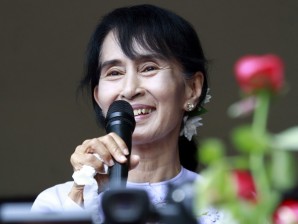NAYPYIDAW — Myanmar opposition leader Aung San Suu Kyi will make her long-awaited debut in parliament Wednesday after abandoning a legislative boycott that had cast a shadow over the political reform process.
The Nobel Peace laureate and other newly elected members of her National League for Democracy (NLD) party had refused to swear a parliamentary oath which “safeguards” the army-created constitution.
But after its plea to President Thein Sein’s reformist government to amend the wording was unsuccessful, Suu Kyi on Monday agreed to make the pledge and take her seat in the fledgling parliament in the capital Naypyidaw.
“The reason we accept [the oath], firstly is the desire of the people. Our voters voted for us because they want to see us in parliament,” she said.
Members of the NLD — the main opposition force after securing 43 of the 44 seats it contested in April 1 by-elections — will attend parliament on Wednesday, elected NLD member Win Htein told Agence France-Presse on Tuesday.
“She will go to the parliament to take an oath and go back [to Yangon] in the evening,” he said of Suu Kyi.
“Most of the NLD elected members have arrived already. We are ready now to take an oath by attending parliament.”
UN chief Ban Ki-moon on Tuesday welcomed Suu Kyi’s climbdown as a sign of the “flexibility” required to help Myanmar make the transition from half a century of a military-run state.
“I know that it must have been a very difficult decision,” Ban said.
“But a real leader demonstrates flexibility for the greater cause of the people, for country. That is what she has done yesterday. I really admire and respect her decision.”
Speaking alongside Ban at her lakeside villa in Yangon, Suu Kyi said: “We have always believed in being flexible throughout the years of our struggle.”
Suu Kyi’s boycott meant she was not present in the legislature in the capital to witness Monday’s landmark speech by Ban — the first address by a foreign dignitary.
The NLD, which boycotted a controversial 2010 election, agreed to rejoin the political mainstream last year after a series of reforms by the government.
Suu Kyi has vowed to push for an amendment of the 2008 constitution, under which one quarter of the seats in parliament are reserved for unelected military officials.
After spending much of the last two decades under house arrest, Suu Kyi was freed in 2010 and her election to parliament has been greeted by the international community as a step towards democracy.
She has shown increased confidence in Thein Sein’s government in recent weeks, calling for the suspension of EU sanctions and planning her first international trip in 24 years.
Last week, European Union nations suspended most sanctions against the impoverished nation for one year to reward the reforms, which included releasing some political prisoners.
